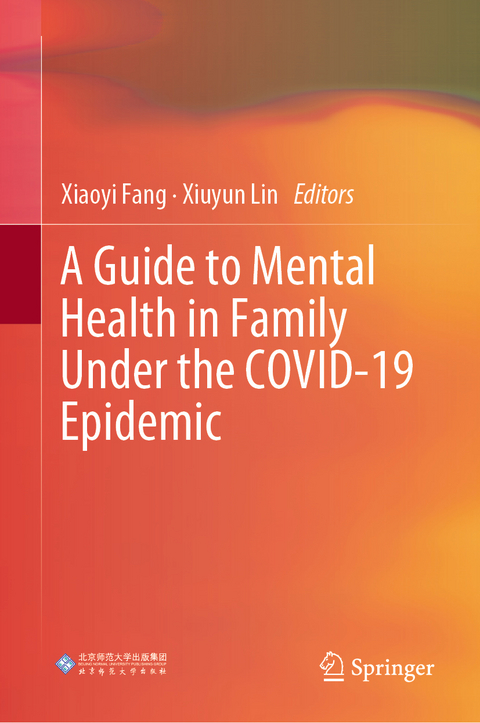
A Guide to Mental Health in Family Under the COVID-19 Epidemic
Springer Verlag, Singapore
978-981-19-6544-9 (ISBN)
Xiaoyi Fang, Ph.D., is a second-level professor of Beijing Normal University and a doctoral supervisor. He is a distinguished professor of Chang Jiang Scholars Program of Ministry of Education of the People’s Republic of China in 2009. Currently, he is a director of Center for Marriage and Family Research and Therapy, BNU, and a director of the Guidance Research Center for High School Students, BNU. The main research directions of Fang are marriage and family research and therapy, and adolescent addiction and mental health of primary and middle school students. At the same time, Fang is a secretary of the Social Science Commission of the Ministry of Education Department of Pedagogy and Psychology of China, a deputy secretary and a member of universities mental health experts advising committee of Ministry of Education of China, a member and deputy secretary of primary and junior schools mental health experts advising committee of Ministry of Education of China, an executive directorof Chinese Psychological Society, a director of branch department of the developmental Psychology of Chinese Psychological Society, a director of China Education Association, the chairman of branch department of developmental Psychology of China Education Association, a vice-president of branch department of cognitive science of Chinese Society for Cognitive Science, the chairman of alliance for high school students guidance and development, the chairman of alliance for marriage and family research and therapy, a part-time professor of the Chinese University of Hong Kong, and so on. He is the executive deputy editor of core journal Psychological Development and Education and the editorial board member of Studies of Psychology and Behavior and Chinese Journal of Clinical Psychology. Fang is a project investigator of Ministry of Education’s philosophy and social science research key projects, the National Natural Science Foundation of China, foundation works of the Ministry of Science, and other 24 vertical research projects in Beijing. He is a co-project investigator of six international cooperative projects of National Institute of Health, and 17 domestic horizontal cooperative projects. He has published more than 20 monographs and translations, over 130 research reports in international academic journals, and over 220 research reports in domestic academic journals. Fang has submitted five policy consulting reports which have been approved and adopted by relevant state leaders and the Ministry of Education Departments to the general office of central government and the relevant departments of the Ministry of Education. Fang was rewarded first prize in the fourth national excellent education scientific research achievements by the Ministry of Education, second prize in the fourth Chinese university humanities and social science research by the Ministry of Education, third prize in seventh Chinese university humanities and social science research, first prize in the seventh higher education teaching achievement in Beijing, and second prize in the seventh excellent achievement of philosophy and social sciences in Beijing. Fang was selected by support plan to the new century excellent talents of the Ministry of Education in 2005. He has been invited by the Organization Department of the CPC Central Committee, the Ministry of Education, and the Shanghai Municipal Organization Department to report and give lectures on marriage and family for officials of state organs, the Ministry of Education, and Shanghai Municipal Bureau of Affairs.
Part 1:Stress response caused by the epidemic.- 1. Stress response and its symptoms.- 2. Stages of stress response.- 3. Self-assessment of stress response.- Part 2: Self-help approaches to stress response.- 1. Understand the novel coronavirus and reduce panic.- 2. Protect yourself from panic.- 3. Restore life and eliminate panic.- 4. Accept your emotions and relieve anxiety.- 5. Change cognition for positive thinking.- 6. Shift attention and focus on others.- 7. Seek professional help to cope with panic.- Part 3: Family coping methods for stress response.- 1. How to arrange home life reasonably.- 2. How to help children through special times.- 3. How to help families with stress response.- 4. How to help quarantined family members.- 5. How to deal with strong response of family members with mental disorders History.- 6. How to deal with the loss of loved ones.- 7. How to deal with family risks.- Part 4: How to deal with family conflicts caused by the epidemic.- 1. How to dealwith family conflicts.- 2. How to improve family relationships.
| Erscheinungsdatum | 06.12.2022 |
|---|---|
| Zusatzinfo | 4 Illustrations, color; 8 Illustrations, black and white; XIII, 77 p. 12 illus., 4 illus. in color. |
| Verlagsort | Singapore |
| Sprache | englisch |
| Original-Titel | 《家安心安:新冠肺炎疫情下的家庭心理自助手册》 |
| Maße | 155 x 235 mm |
| Themenwelt | Geisteswissenschaften ► Psychologie ► Psychoanalyse / Tiefenpsychologie |
| Geisteswissenschaften ► Psychologie ► Sozialpsychologie | |
| Medizin / Pharmazie ► Medizinische Fachgebiete ► Psychiatrie / Psychotherapie | |
| Studium ► Querschnittsbereiche ► Prävention / Gesundheitsförderung | |
| Schlagworte | Anti-pandemic • Covid-19 • Family members • Family Therapy • Home quarantine • Mental Health • Pandemic • positive psychology • Relationship • Self Help |
| ISBN-10 | 981-19-6544-7 / 9811965447 |
| ISBN-13 | 978-981-19-6544-9 / 9789811965449 |
| Zustand | Neuware |
| Informationen gemäß Produktsicherheitsverordnung (GPSR) | |
| Haben Sie eine Frage zum Produkt? |
aus dem Bereich


